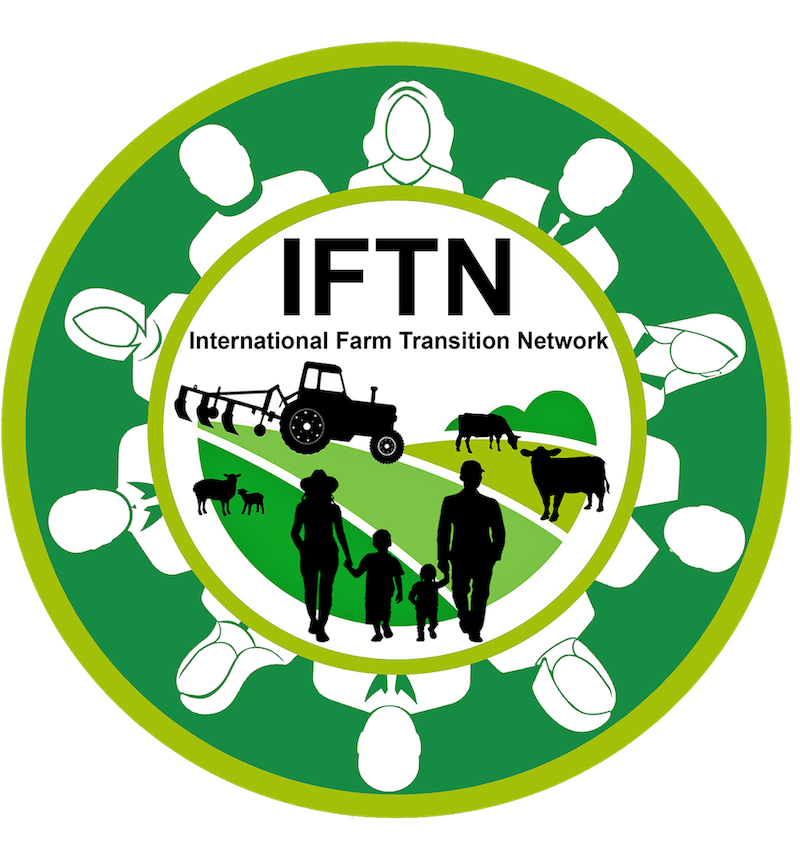International Perspectives on Farm Succession and Retirement in Later Life
By Dr. Shane Conway
National University of Ireland, Galway
The farming community increasingly consists of a farm population with a high age profile. Demographic trends in many parts of the U.S.A., Europe and beyond reveal an inversion of the age pyramid with those aged 65 years and over constituting the fastest growing sector of the farming workforce.
Dr Shane Conway, Postdoctoral Researcher in the Discipline of Geography’s Rural Studies Unit at the National University of Ireland, Galway (NUI Galway) was awarded a Farm Succession Coordinator Certification by the International Farm Transition Network (IFTN) in September 2015 whilst he was carrying out his PhD on this issue entitled ‘Exploring the Human Dynamics Affecting the Intergenerational Family Farm Transfer Process in Later Life: A Roadmap for Future Policy’. This PhD research, supervised by Dr John McDonagh and Dr Maura Farrell at NUI Galway, provided an in-depth, nuanced understanding of the complex nature of the various emotional and social factors governing the behaviour patterns and attitudes of older farmers facing the ‘twin processes’ of farm succession and retirement.
Empirical findings from this research indicate that the senior generation’s reluctance and indeed resistance to alter the status quo of the existing management and ownership structure of the family farm is undoubtedly strong within the farming community. The reasons why older farmers fail to plan effectively and expeditiously for the future as are expansive, and range from the potential loss of identity, status and power that may occur as a result of engaging in the process, to the intrinsic, multi-level relationship farmers have with their farms in later life. The common denominator however, is that intergenerational family farm transfer is about emotion. The so-called ‘soft issues’ i.e. the emotional and social issues, identified in my research, are the issues that distort and dominate the older generation’s decisions on the future trajectory of the farm. Such issues have resulted in intractable challenges for farm succession and retirement policy over the past fifty years. These really are the ‘hard issues’.
In terms of research recommendations, as it is the senior generation who ultimately decide whether intergenerational farm transfer occurs or not, Dr Conway’s research findings suggest that financial enticements encouraging intergenerational farm transfer must be accompanied by a comprehensive set of interventions to deal with the personal and social loss that the senior generation of the farming community may experience upon transferring the farm. A series of recommendations are set forth geared specifically towards ensuring farmers’ emotional wellbeing and quality of life in old age, such as the services of a certified Farm Succession Facilitator, trained in accordance with an international best practice model, such as the one offered by the International Farm Transition Network (IFTN) in the U.S.A., ‘farmer-sensitive’ policy design and implementation, and the establishment of a national voluntary organisation that represents the needs of the senior generation of the farming community, equivalent to that of younger people in rural Ireland i.e. Macra na Feirme (Stalwarts of the Land) for example. Such recommendations are directed at policy makers and key stakeholders who have the means and ability to deliver future interventions and programmes that sensitively deal with problematic issues surrounding this complex and highly topical area.
As this research on the issue of intergenerational farm transfer is not just a national or even European challenge, but a global one, the recommendations outlined in this research are equally as relevant and applicable in the U.S.A. as they are in an Irish context. They essentially aim to allow older farmers to maintain and sustain normal day to day activity and behaviour on their farms in later life, to help ensure their sense of purpose and quality of life as they age, whilst also ‘releasing the reins’ to allow for the necessary delegation of managerial responsibilities and ownership of the family farm to their successors. If this fails to materialise however, there will continue to be extraordinary socio-economic challenges for younger people aspiring to pursue farming as a career. As it is a worldwide policy mantra that the survival, continuity and future prosperity of the agricultural sector, traditional family farm model and broader sustainability of rural society depends on an age-diverse farming population, these recommendations are very timely.
Dr Conway continually advocates in his academic publications and in the farming press that policy must not forget about, and disregard the older generation of the farming community when devising generational renewal in agriculture policy. Farming is a way of life for many of them and there can be detrimental consequences to their emotional wellbeing if they are cut off from their daily routines on the farm. Furthermore, the loss of older farmers from the farming sector can create critical shortages of experienced personnel, which in turn can have negative effects on farm performance. The older generation hold an invaluable store of locally specific tacit and lay knowledge developed over years of regularized interaction and experience working on the family farm, that the younger generation have not yet accumulated. Such ‘soil-specific human capital’ as it is referred to in academic literature, is not easily transferable, communicated or learnable, and as a result, the family farm may be left in the hands of a young, inexperienced farmer, unable to make competent management decisions without the continued guidance and advice of the senior generation.
Dr Conway has published this research in a number of international peer-reviewed journals since he completed the Farm Succession Coordinator Certification training programme offered by the International Farm Transition Network (IFTN) at the University of Wisconsin, Madison in September 2015. Please see below:
– Conway, S.F., McDonagh, J., Farrell, M. & Kinsella, A. (2019) Human dynamics and the intergenerational farm transfer process in later life: A roadmap for future generational renewal in agriculture policy, International Journal of Agricultural Management, 8(1), 22-30. Link: https://www.ingentaconnect.com/search/article?option1=tka&value1=Human+dynamics+and+the+intergenerational+farm+transfer+process+in+later+life&pageSize=10&index=1
– Conway, S.F., McDonagh, J., Farrell, M. & Kinsella, A. (2018) Till death do us part: Exploring the Irish farmer-farm relationship in later life through the lens of ‘Insideness’, International Journal of Agricultural Management, 7(1), 1-13. Link: https://www.ingentaconnect.com/search/article?option1=tka&value1=Till+death+do+us+part&pageSize=10&index=10
– Conway, S.F., McDonagh, J., Farrell, M. and Kinsella, A. (2017) Uncovering Obstacles: The Exercise of Symbolic Power in the Complex Arena of Intergenerational Family Farm Transfer, Journal of Rural Studies, 54, 60-75. Link: https://www.sciencedirect.com/science/article/abs/pii/S0743016717301547
– Conway, S.F., McDonagh, J., Farrell, M. and Kinsella, A. (2016) Cease Agricultural Activity Forever? Underestimating the Importance of Symbolic Capital, Journal of Rural Studies, 44, 164-176. Link: https://www.sciencedirect.com/science/article/abs/pii/S0743016716300158

Dr Shane Conway
Rural Studies Unit, Discipline of Geography, NUI Galway, Galway, Ireland
Email: shane.conway@nuigalway.ie
Twitter: @ShaneConwayNUIG & @NUIGalwayRural
